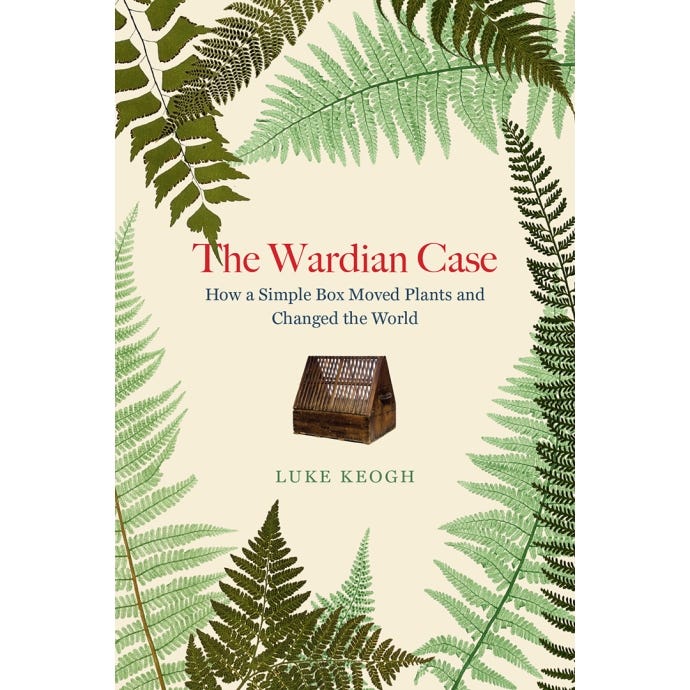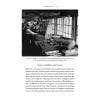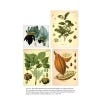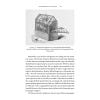The Wardian Case
Product Description
Award of Excellence in History, CBHL Annual Literature Awards 2021
Winner New South Wales Premier’s History Awards, General History Prize, 2021
Garden Book of the Year, Garden Media Guild Awards, 2021
Author Luke Keogh leads us across centuries and seas to show how a humble piece of Victorian technology spurred a revolution in the movement of plants, forever altering the global environment.
Award of Excellence in History, The Council on Botanical and Horticultural Libraries Annual Literature Awards 2021
Winner New South Wales Premier’s History Awards, General History Prize, 2021
Garden Book of the Year, Garden Media Guild Awards, 2021
Author: Luke Keogh. 288 pp. 19 colour photographs, 40 b/w illustrations. 230 x 155 mm. Hardback, ISBN 978 1 84246 719 0, Kew Publishing, 2020.
Roses, jasmine, fuchsia, chrysanthemums, and rhododendrons bloom in gardens across the world, and yet many of the most common varieties have root in Asia. How is this global flowering possible? In 1829, surgeon and amateur naturalist Nathaniel Bagshaw Ward placed soil, dried leaves, and the pupa of a sphinx moth into a sealed glass bottle, intending to observe the moth hatch. But when a fern and meadow grass sprouted from the soil, he accidentally discovered that plants enclosed in glass containers could survive for long periods without watering. After four years of experimentation in his London home, Ward created traveling glazed cases that would be able to transport plants around the world. Following a test run from London to Sydney, Ward was proven correct: the Wardian case was born, and the botanical makeup of the world’s flora was forever changed.
In our technologically advanced and globalized contemporary world, it is easy to forget that not long ago it was extremely difficult to transfer plants from place to place, as they often died from mishandling, cold weather, and ocean salt spray. In this first book on the Wardian case, Luke Keogh leads us across centuries and seas to show that Ward’s invention spurred a revolution in the movement of plants—and that many of the repercussions of that revolution are still with us, from new industries to invasive plant species. From the early days of rubber, banana, tea, and cinchona cultivation—the last used in the production of the malaria drug quinine—to the collecting of beautiful and exotic flora in the first great greenhouses at the Royal Botanic Gardens, Kew and the United States Botanical Garden in Washington, DC, the Wardian case transformed the world’s plant communities, fuelled the commercial nursery trade and late nineteenth-century imperialism, and forever altered the global environment.
Media coverage:
Keogh covers the Ripping Yarns-style consequences of its [the Wardian case] use: from plant hunters sending back specimens to British nurseries...to the huge economic benefits for empire builders. Caroline Donald, The Daily Telegraph
Any gardener fascinated by history will find this well-told story fruitful. Publishers Weekly
Explores how a humble box made of wood and glass changed the course of world history. Kirkus Reviews
This is a compelling read which I would readily recommend. Geraldine Reid, Archives of Natural History
If you’re a sucker for tales about early plant explorers (as I am) this is an eye-opening read. Sonia Day, Trellis
Keogh’s meticulous, globe-trotting investigation is a sobering reminder of the profound impact humans have had on the planet simply by moving plants. Dean Jobb, The Scotsman
Luke Keogh is a curator and historian interested in the global movement of plants in the nineteenth and early twentieth centuries. Among his many awards and prizes is the Sargent Award from the Arnold Arboretum of Harvard University. Currently he is senior curator at the National Wool Museum in Geelong, Australia, and an honorary research fellow at Deakin University in Melbourne, Australia. In 2020, he is fellow of the 4A Lab, Berlin, an innovative humanities research lab supported by the Max Planck Institute for Art History, Florence and the Prussian Cultural Heritage Foundation.
Category:
Reviews
Delivery Information
United Kingdom
We offer FREE delivery on UK-only orders over £50 (Tracked Standard delivery service). (This does not apply to our print-on-demand service)
Our other delivery costs are as follows:
- UK Tracked Standard - £5 (delivery 3-6 working days from date of order)
- UK Tracked Express - £8.95 (delivery 1-3 working days from date of order)
Note: Mat Collishaw framed prints can take up to 2 weeks for delivery and are excluded from promotional discounts.
Age restricted products
If your basket contains age restricted products, our courier will request passport or driving license ID if the recipient looks under 25.
Gift membership products
Gift Membership packs are sent using a tracked and signed for service. Unfortunately, we are unable to replace gift memberships that are lost or misplaced once received by the recipient.
International and EU
International and EU orders are subject to variable postage costs calculated at checkout; these are dependent on the size and value of your order.
Orders to EU and International addresses may be subject to local customs duty or taxes. You will need to pay any additional charges for customs clearance, charges include local VAT and duty based on the value and origin of the product upon receipt of your order.
Weight restrictions: We are unable to ship orders where the total weight is over 2kg outside of the United Kingdom.
Product restrictions: We are unable to ship seeds, plants, bulbs, inflammable products, sharp and/or bladed items, food and beverages outside of the United Kingdom.







